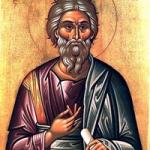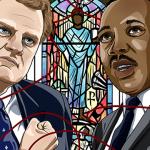What if there really was nothing before the first things in the universe? Must atheistic conclusions necessarily follow? Not according to some arguing that God and the initial chaos of the early universe could have existed together in a state of co-dependency.
Last week I covered theological reactions to the tentative science of quantum cosmology. Theologians like Paul Copan and William Lane Craig defend a notion of creation ex nihilo in which there was a moment when God existed alongside nothing else and was causally responsible for the first moment the universe came into existence. However, not all theologians are in agreement with this conclusion. Some believe the scientific possibility of an infinitely persisting universe demands some stronger theological modifications. Today I am going to focus specifically on the proposal of Sjoerd Bontig and its clear contrast with creation ex nihilo.
Remember that the theologies examined last week argued God was not eliminated as a causal explanation for the universe because theories like Stephen Hawking’s no-boundary proposal still result in a finite surface, some existing thing. Since it is not nothing, the question of why there is something rather than nothing can be applied to this scientific proposal. However, if divine creativity is still necessary to explain the contingent features of the universe Bonting does not believe that creativity can be so easily associated with creation out of nothing. Essentially, all scientific observations seem to be converging on the fact that some sort of existing chaotic reality always existed and provided the material from which our universe developed. Thus, the concept of God as a transcendent designer of all that exists is an improper theological focus because such a God would entail rejecting growing scientific understandings of the universe that God is purported to have designed.
In Bontig’s view, God and an initial chaotic reality always existed in mutual determination. God did not precede and create the chaotic substance, nor did the chaos come before God. Rather, the chaos is the substance with which God’s creativity works and that creativity is the loving source of the transformation of that chaos into more perfected states of life in the universe. Inherent in this approach is a rejection of any distinction between original and continuous/sustaining creativity. Creation ex nihilo is an example of the former theory of creativity: there was nothing before the original creative moment brought something into existence. In Bonting’s argument all creativity is sustaining. God continually works on preserving and transforming something that already exists into something new. There was never creation ex nihilo, only creation continua.
 Some of the shifts in theological focus brought on by this small move of positing creator and creation in existence together can be listed as follows:
Some of the shifts in theological focus brought on by this small move of positing creator and creation in existence together can be listed as follows:
From a dualistic understanding of God and the universe toward non-dualism with both existing on the same level
From a controlling or completely dominant God toward an ecological or relational God
From a settled transcendent nature of God as creator toward one growing in relation to the world
From the universe as the settled product of God toward a continually changing product
Last week I mentioned Gordon Kaufman’s book In the Beginning…Creativity. His specific thesis regarding evolution and creativity is a topic for another month, but I think his explanation of creativity immanent in the world eloquently captures the sort of shift occurring in Bontig’s thought.
Kaufman describes the theological reconstruction of the doctrine of creation into creativity among existing things as ecological in that it is meant to impact the way Christians behave in the world. He reads the history of Christian theology as an anthropocentric story in which common-sense ideas about human independence from and power over the world were projected onto God. This God could then be focused on at the exclusion of the world and its changes. It seems the options are theological supernaturalism disconnected from but supposedly explaining the natural world or the atheistic embrace of naturalism by accepting the messiness of reality. However, there is another option. Kaufman demands a theological reconfiguration of the concept of creation that will propel a theological turn back toward the world rather than retreat. I suspect with Bontig, though this is my guess since Bontig is not covered in Kaufman’s book, Kaufman would promote an understanding of God’s creativity as mysterious and bringing forth the absolutely new into reality. It should be noted that this shift in theological focus is not a divinization of creative instances science can discover and predict. Bontig understands God as mysterious and performing actions that cannot be anticipated beforehand. The result is that settled facts about reality are not the focal point of creation. There are always two aspects of chaos present.
 The existence of an original chaotic reality sets up a relation between God and reality that is relational, tends toward non-dualism, and directs focus toward continual rather than original creation. With focus on continued creation in reality, another chaotic moment is found as mystery and novelty reveal many different, growing, and surprising aspects of reality. God identified with creativity in relation to the world becomes intimately connected with the world in its current state as well as whatever it becomes in the future.
The existence of an original chaotic reality sets up a relation between God and reality that is relational, tends toward non-dualism, and directs focus toward continual rather than original creation. With focus on continued creation in reality, another chaotic moment is found as mystery and novelty reveal many different, growing, and surprising aspects of reality. God identified with creativity in relation to the world becomes intimately connected with the world in its current state as well as whatever it becomes in the future.
To make it clear how Bontig’s approach would handle the issues raised by Hawking, this God can solve the problem of positing a creator in relation to an infinite universe because God coexists with that universe in its infinity. God and Hawking’s no-boundary proposal would have persisted in mutual determination while being transformed into the universe and its present state.
















